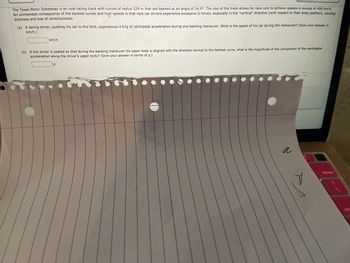
College Physics
11th Edition
ISBN: 9781305952300
Author: Raymond A. Serway, Chris Vuille
Publisher: Cengage Learning
expand_more
expand_more
format_list_bulleted
Concept explainers
Question

Transcribed Image Text:The Texas Motor Speedway is an oval racing track with curves of radius 229 m that are banked at an angle of 24.0°. The size of the track allows for race cars to achieve speeds in excess of 400 km/h.
An unintended consequence of the banked curves and high speeds is that race car drivers experience excessive G forces, especially in the "vertical" direction (with respect to their body position), causing
dizziness and loss of consciousness.
(a) A daring driver, pushing his car to the limit, experiences 4.67g of centripetal acceleration during one banking maneuver. What is the speed of his car during the maneuver? (Give your answer in
km/h.)
km/h
(b) If the driver is seated so that during the banking maneuver his upper body is aligned with the direction normal to the banked curve, what is the magnitude of the component of the centripetal
acceleration along the driver's upper body? (Give your answer in terms of g.)
a
delete
Expert Solution
This question has been solved!
Explore an expertly crafted, step-by-step solution for a thorough understanding of key concepts.
This is a popular solution
Trending nowThis is a popular solution!
Step by stepSolved in 2 steps with 2 images

Knowledge Booster
Learn more about
Need a deep-dive on the concept behind this application? Look no further. Learn more about this topic, physics and related others by exploring similar questions and additional content below.Similar questions
- A curve of radius 110 m is banked at an angle of 12.2°. At what speed can it be negotiated under icy conditions where friction is negligible?arrow_forwardA car of mass 500 kg is traveling on a circular banked roadway that is inclined at an angle of 0 = 20° with a radius of 100 m. What is the only speed at which the car can sliding navigate the bank without up or down the incline?arrow_forwardb) The maximum speed that a car can turn a curve of 9.00 m radius without skidding is 70.0 mph (miles per hour). If the coefficient of friction between the tires and the road is 0.600, what is the rated speed of the banked curve? On a wet day, the same car begins to skid on the curve when its speed reaches 60.0 mph. What is the coefficient of friction in this case? Please answer with complete solution and fre body diagramarrow_forward
- A man riding a bicycle with a 100 kg total mass is performing horizontal circles on flat track. If the coefficient of static friction between the tires and track is 0.600, find the smallest radius the man can make when travelling at a speed of 10.0 m/s.arrow_forwardA sport car of mass m =2, 000 lb moving with velocity v = 160 mph must make a U-turn on a pavement with friction coefficient of μs =0.5. In what (a) minimal turn radius and (b) minimal time can the driver make the turn without losing speed and skidding? Why do Formula-1 race car drivers sacrifice a lot of driving time by replacing tires so often when racing?arrow_forwardA car is trying to make a turn on a banked curve on a very icy day and the frictional force between the tires and road is zero. The curve has a radius of 50 m and the car is moving at 12 m/s. What angle should the curve be banked at for this to happen safely?arrow_forward
- A vehicle weighing 500 kilograms travels on a round banked highway that is inclined at angle of theta=20 and has a radius of 100 m at one speed. This is the quickest the vehicle can go without sliding up or down the hill. If the static friction force is high enough to allow the vehicle to handle the curve, what is the one speed at which the car can go without sliding down?arrow_forwardDriving in your car with a constant speed of v= 22 m/s you encounter a bump in the road that has a circular cross-section. If the radius of curvature of the bump is 52 m, find the apparent weight of a 70-kg person in your car as you pass over the top of the bump.arrow_forward
arrow_back_ios
arrow_forward_ios
Recommended textbooks for you
 College PhysicsPhysicsISBN:9781305952300Author:Raymond A. Serway, Chris VuillePublisher:Cengage Learning
College PhysicsPhysicsISBN:9781305952300Author:Raymond A. Serway, Chris VuillePublisher:Cengage Learning University Physics (14th Edition)PhysicsISBN:9780133969290Author:Hugh D. Young, Roger A. FreedmanPublisher:PEARSON
University Physics (14th Edition)PhysicsISBN:9780133969290Author:Hugh D. Young, Roger A. FreedmanPublisher:PEARSON Introduction To Quantum MechanicsPhysicsISBN:9781107189638Author:Griffiths, David J., Schroeter, Darrell F.Publisher:Cambridge University Press
Introduction To Quantum MechanicsPhysicsISBN:9781107189638Author:Griffiths, David J., Schroeter, Darrell F.Publisher:Cambridge University Press Physics for Scientists and EngineersPhysicsISBN:9781337553278Author:Raymond A. Serway, John W. JewettPublisher:Cengage Learning
Physics for Scientists and EngineersPhysicsISBN:9781337553278Author:Raymond A. Serway, John W. JewettPublisher:Cengage Learning Lecture- Tutorials for Introductory AstronomyPhysicsISBN:9780321820464Author:Edward E. Prather, Tim P. Slater, Jeff P. Adams, Gina BrissendenPublisher:Addison-Wesley
Lecture- Tutorials for Introductory AstronomyPhysicsISBN:9780321820464Author:Edward E. Prather, Tim P. Slater, Jeff P. Adams, Gina BrissendenPublisher:Addison-Wesley College Physics: A Strategic Approach (4th Editio...PhysicsISBN:9780134609034Author:Randall D. Knight (Professor Emeritus), Brian Jones, Stuart FieldPublisher:PEARSON
College Physics: A Strategic Approach (4th Editio...PhysicsISBN:9780134609034Author:Randall D. Knight (Professor Emeritus), Brian Jones, Stuart FieldPublisher:PEARSON

College Physics
Physics
ISBN:9781305952300
Author:Raymond A. Serway, Chris Vuille
Publisher:Cengage Learning

University Physics (14th Edition)
Physics
ISBN:9780133969290
Author:Hugh D. Young, Roger A. Freedman
Publisher:PEARSON

Introduction To Quantum Mechanics
Physics
ISBN:9781107189638
Author:Griffiths, David J., Schroeter, Darrell F.
Publisher:Cambridge University Press

Physics for Scientists and Engineers
Physics
ISBN:9781337553278
Author:Raymond A. Serway, John W. Jewett
Publisher:Cengage Learning

Lecture- Tutorials for Introductory Astronomy
Physics
ISBN:9780321820464
Author:Edward E. Prather, Tim P. Slater, Jeff P. Adams, Gina Brissenden
Publisher:Addison-Wesley

College Physics: A Strategic Approach (4th Editio...
Physics
ISBN:9780134609034
Author:Randall D. Knight (Professor Emeritus), Brian Jones, Stuart Field
Publisher:PEARSON